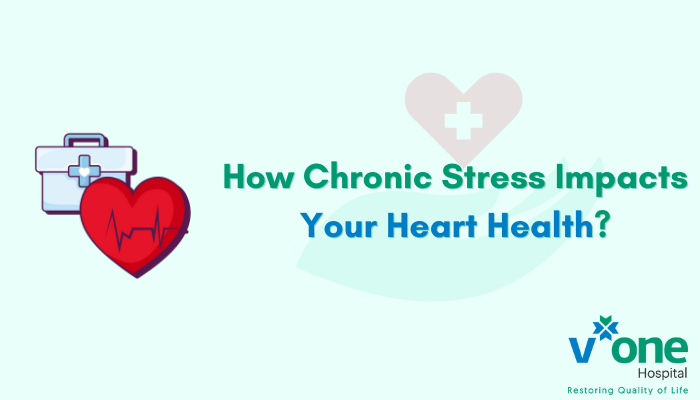Chronic Stress and Heart Health: The Surprising Connection
Life as you know brings a roller-coaster of emotions, and a little stress now and then is inevitable. A little stress is even useful in getting you on your feet, helping you meet deadlines and achieve goals, and motivating you to make good changes in your life. In an emergency condition, it can even save your life. But constant stress can create a myriad of problems for an otherwise healthy individual.
What is Chronic Stress?
When you have been on the edge and stressed out for days or weeks on end, it could be a sign of chronic stress and needs to be taken seriously.
What does Stress do to your Body and Mind?
We like to believe that we remain unaffected in the face of troubles like financial difficulties, family discord, work stress, or a marriage that’s falling apart. But long-term distress brought on by such afflictions can hurt you more than you realize as the stress may manifest psychologically as anxiety, depression, rumination, irritability, and insomnia, or physically in the form of headaches, stomach distress, aching muscles, and low energy.
And while that’s bad enough in the long run, one of the more morbid consequences of chronic stress is how it affects your heart. Those long hours in a high-demand work environment might be causing you more than just burnout if you take a deeper look.
How does Stress Cause Heart Problems?
A 2017 study in The Lancet studied brain activity, bone marrow activity, and artery inflammation to discover a significant link between stress and cardiovascular disease.
When you experience stress, your body releases adrenaline, a hormone that temporarily speeds up your breathing, heart rate, and blood pressure, putting you in a “fight or flight” response.
Since stress can cause high blood pressure, it can increase your risk for a heart attack or stroke. And this can be made worse by habits like smoking, overeating, and lack of physical activity, which are also brought on by chronic stress as unhealthy coping mechanisms. It’s bad for your body to constantly be exposed to stress hormones. Additionally, studies have also linked stress with changes in the way your blood clots, making you more likely to have a heart attack. Stress also triggers inflammation, which is a known risk factor for heart disease.
Stress: What can you do About It?
No matter what you do, you can never completely eliminate stress from your life. But there are things you can do to help your mind and body cope with it:
- Make time for exercise – it will keep you physically and mentally fit.
- If the stress is affecting you in such a way that it’s making it harder for you to just go about your daily activities, reach out. Talk to a psychotherapist – they can help you navigate the stress, and give you the tools to face life’s problems head-on. Good psychological health is also linked to a lower risk of heart disease and death.
- If you’ve taken them up, quit unhealthy habits (or coping mechanisms) like smoking, drinking, overeating comfort food, or not exercising at all.
- Connect with the people who care about you, or whom you care about. Meet up if you can.
- Change what you can and accept what you can’t change.
- Establish better boundaries – learn to say “no” when you need to.
- Get better sleep, and remember that the quality of your sleep matters just as much as the quantity.
- Take up the practices of reading, listening to music, yoga, meditation, or whatever helps you relax, and do it every day.
- Take up hobbies that you are passionate about, or whatever makes you feel alive. It can be a great way to keep you distracted from negative thoughts.
- Consider taking up journaling to create an outlet for your emotions instead of bottling them up.
- Cut back on junk food and begin to appreciate more natural foods like fresh fruits and vegetables.
- Unplug from the digital world to take a break whenever it becomes too much to take in. Even 10 minutes away from a screen can bring you a sense of grounding and give you a fresh start to the next activity in your day.
- Get into the habit of laughing and finding joy in the small things.
- Try to find meaning in life despite the stress.
Being stressed for large periods of time doesn’t just affect your heart, it also affects your creativity and productivity, and keeps you from taking advantage of opportunities that have the power to change your life. When you learn to manage the stress, you can begin to enjoy the good things in life as they pass you by.

